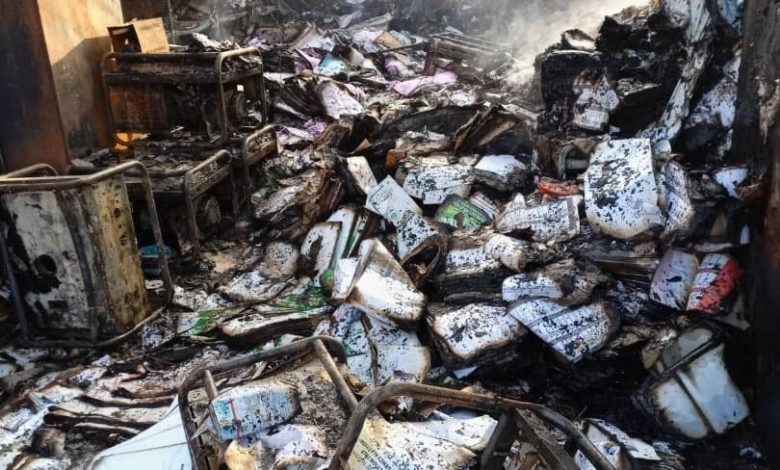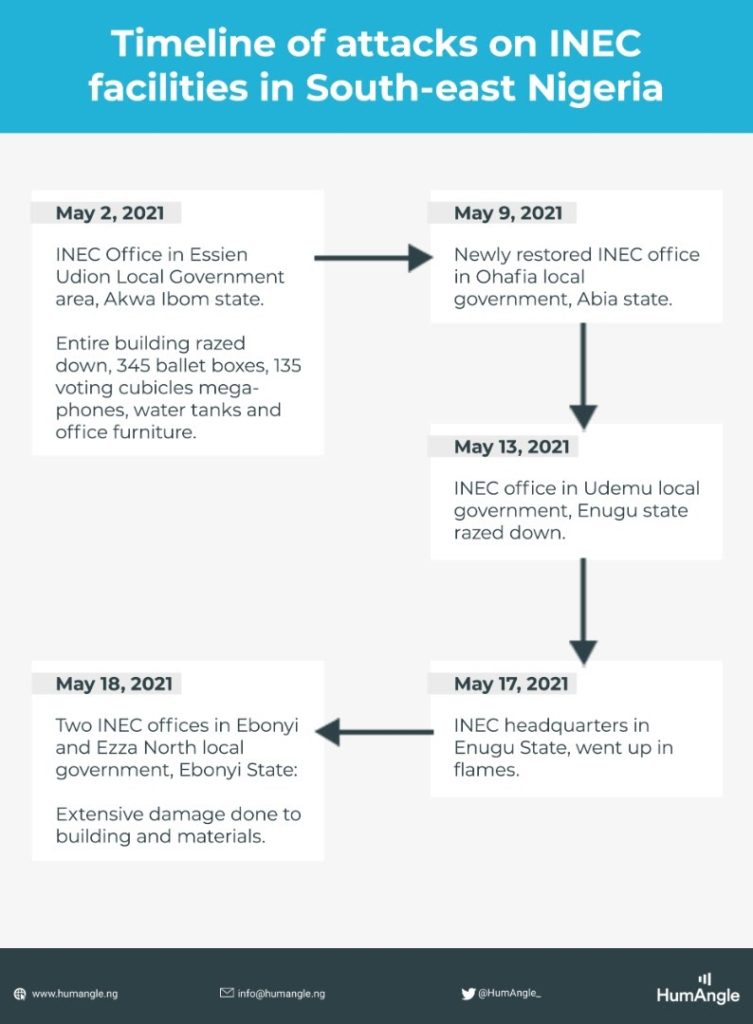Attacks On INEC Offices: A Signpost On What Is To Come?
A wave of attacks on Nigeria's electoral body is putting preparations for the 2023 general elections at risk.

A wave of attacks on Nigeria’s electoral commission offices in southeast Nigeria is raising concerns about preparations for upcoming electoral events, particularly the 2023 general elections.
In May alone, at least five offices of Nigeria’s Independent National Electoral Commission (INEC) were torched in a series of ramped-up attacks that were reminiscent of the election-related violence in 2019.
For instance, an early morning inferno on Sunday, May 2, claimed the entire building of the INEC office in Essien Udim Local Government Area of Akwa-Ibom State, southeast Nigeria, as the security personnel attached to it narrowly escaped death.
Mike Igini, the state Resident Electoral Commissioner (REC), in a statement, said the police investigation was yet to determine the cause of fire while estimating election materials destroyed to include 345 ballot boxes, 135 voting cubicles, megaphones, water tanks and office furniture.
A week later, the recently renovated INEC office in Ohafia Local Government Area of Abia State was also set ablaze by arsonists in a late-night operation on Sunday, May 9.

The trend of attacks continued on May 13 and 17 in Enugu State where the INEC office in Udenu Local Government Area and its headquarters in the capital city were razed down.
Just as the electoral body planned a security meeting on Wednesday, May 19, two of its offices were burnt in Ebonyi State, another Southeast state.
The development has shaken the country.
Is Nigeria’s democracy under attack?
For a country growing inured to violence, the latest attacks on Nigeria’s electoral umpire seem to gain more attention just as early preparations for the 2023 general elections and the Anambra gubernatorial election in November are underway.
In April, the INEC announced that the 2023 general elections were scheduled for Saturday, Feb. 18. It promised to unveil the full elections plan before the year runs out.
Idayat Hassan, who heads the Centre for Democracy and Development (CDD) that has observed elections and democratic processes in Nigeria, says the latest development is not an isolated issue in the myriad of security challenges facing the country.
But attention, she says, is more drawn to the latest development because “people understand the importance of INEC, the body that holds elections which can initiate the change they want.”
For Hassan, the new wave of attacks on INEC offices and other government institutions including security facilities is the latest crisis to befall the West African country of about 200 million population battling insurgency, kidnapping, and other violent clashes.
Police formations and personnel have been targeted for attacks by armed groups in the southeast and south-south regions since the beginning of 2021, and the attacks on the INEC facilities in the same regions are creating more worrisome developments concerning the possibility of future elections.
Between Jan. and May 2021, more than 20 police stations were attacked in the grimiest ramp-up in the ongoing crisis in southern regions. In April, a twin attack on Police headquarters and a correction facility in the southeast Imo state was deemed the deadliest, as attackers made attempts to steal from the police armoury and subsequently released over 1,800 inmates.
Police have blamed the attacks on the proscribed Indigenous People of Biafra (IPOB), a separatist group calling for the independence of the southeast and south-south regions due to discrimination and marginalisation in governance and economic resources.
However, the group has denied involvement: “it is not our mandate to attack security personnel or prison facilities,” it said.
The pattern of the attacks on security formations follows what analysts suggest is similar to the trend of the Boko Haram insurgency at its infancy when attacks were primarily to gather large caches of arms from the state armoury and dislodge trust in the security forces and government institutions.
Nigerian President Muhammadu Buhari, while ordering armed forces to stack up security in the region, described the events as an “act of terrorism” that required swift actions before “the country slides into anarchy.”
Attacks on INEC offices and other government institutions such as the Federal High Court complex in Ebonyi State that was attacked in late April raised questions on the power of the state to protect lives. Many believe that Nigerians are fast losing their trust and confidence in the government to protect citizens and their properties.
But Hassan believes the recent spate of attacks demonstrates that “the Nigerian state is under attack, not democracy.”
“This is so because the Nigerian democracy has not delivered the development people desire in terms of corporate sincerity for the public good.”
Security forces, she said, need to double down in their duties to secure all INEC facilities across but “more importantly the southeast region because of the November elections in Anambra State.”
“They (security agents) just have to up their game in securing the facilities because this is a trend and nobody can secure them better than the security agents,” Hassan argued.
As a response to the security challenges in the south region, the police on Tuesday launched an operation that is expected to nip the situation in the bud.
Dubbed “Operation Restore Peace,” ORP will confront “criminal elements” and address crimes such as banditry, kidnapping and armed robbery, Usman Alkali Baba, Nigerian Inspector-General of the Police said in a statement.
It seeks to “roll back the murderous attacks, violence, proliferation of weapons and other threats to law and order occasioned by the separatist agenda,” Baba said, adding that the military and intelligence agencies will also take part in the operation.
We remain resolute – INEC
The electoral body on Wednesday summoned an emergency meeting of all the Resident Electoral Commissioners in the 36 states and the Federal Capital Territory, Abuja to assess the recent attacks.
Mahmood Yakubu, the chairman of the electoral body, has warned that the attack on the Commission’s facilities may have setbacks on the 2023 elections if it persists.
“Some of our equipment is not purchased off the shelf. Our offices and equipment were built and purchased with taxpayers money,” Festus Okoye, INEC’s National Commissioner and Chairman, Information and Voter Education Committee said in an interview with HumAngle.
“We remain resolute in the pursuit and execution of our mandate in the conduct of free and transparent elections.”
Okoye says the electoral body is “confident that we can replace all the items lost.”
“We appeal to community leaders and communities hosting our offices to remain vigilant and guard our facilities.”
Support Our Journalism
There are millions of ordinary people affected by conflict in Africa whose stories are missing in the mainstream media. HumAngle is determined to tell those challenging and under-reported stories, hoping that the people impacted by these conflicts will find the safety and security they deserve.
To ensure that we continue to provide public service coverage, we have a small favour to ask you. We want you to be part of our journalistic endeavour by contributing a token to us.
Your donation will further promote a robust, free, and independent media.
Donate HereStay Closer To The Stories That Matter




